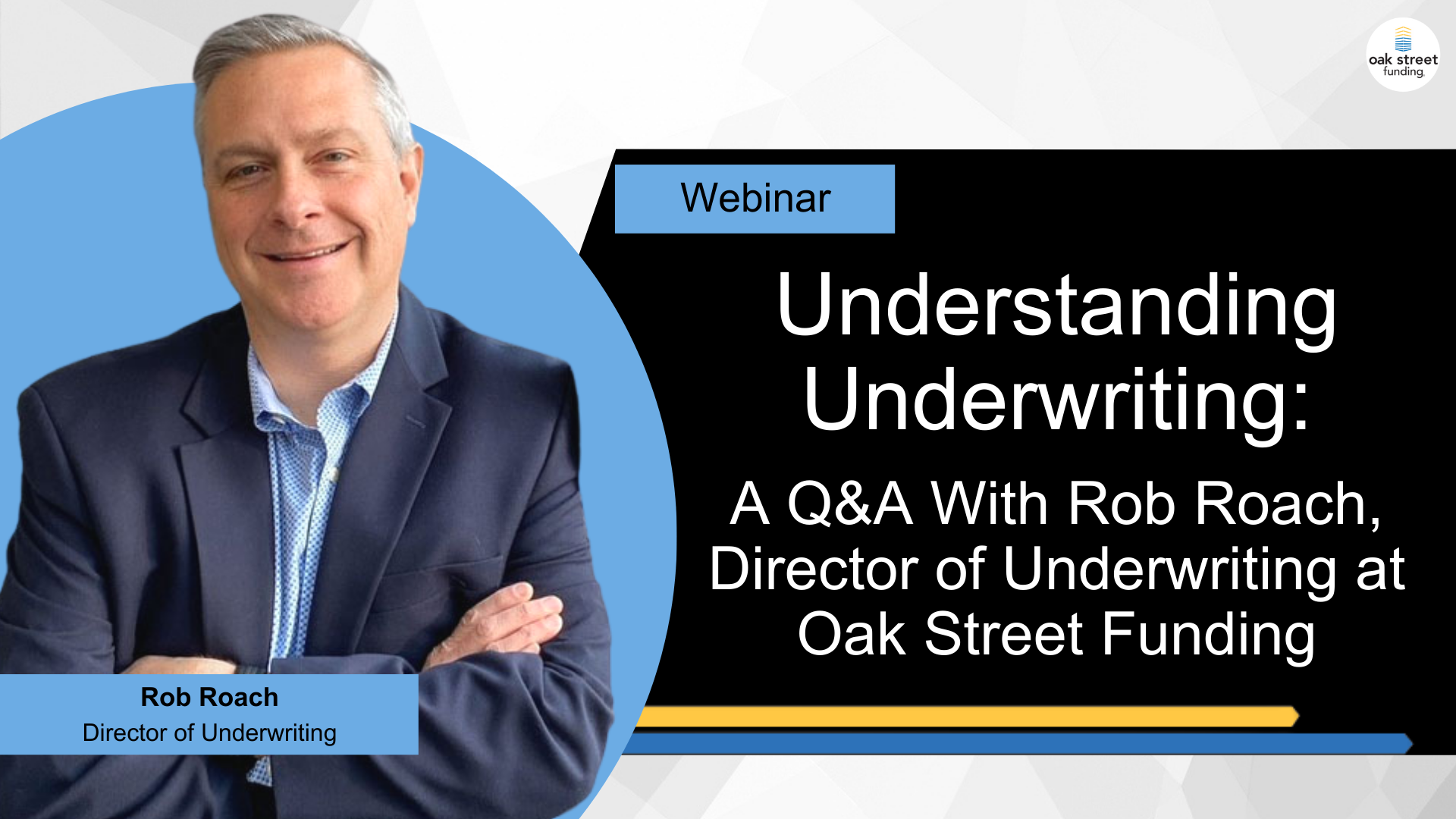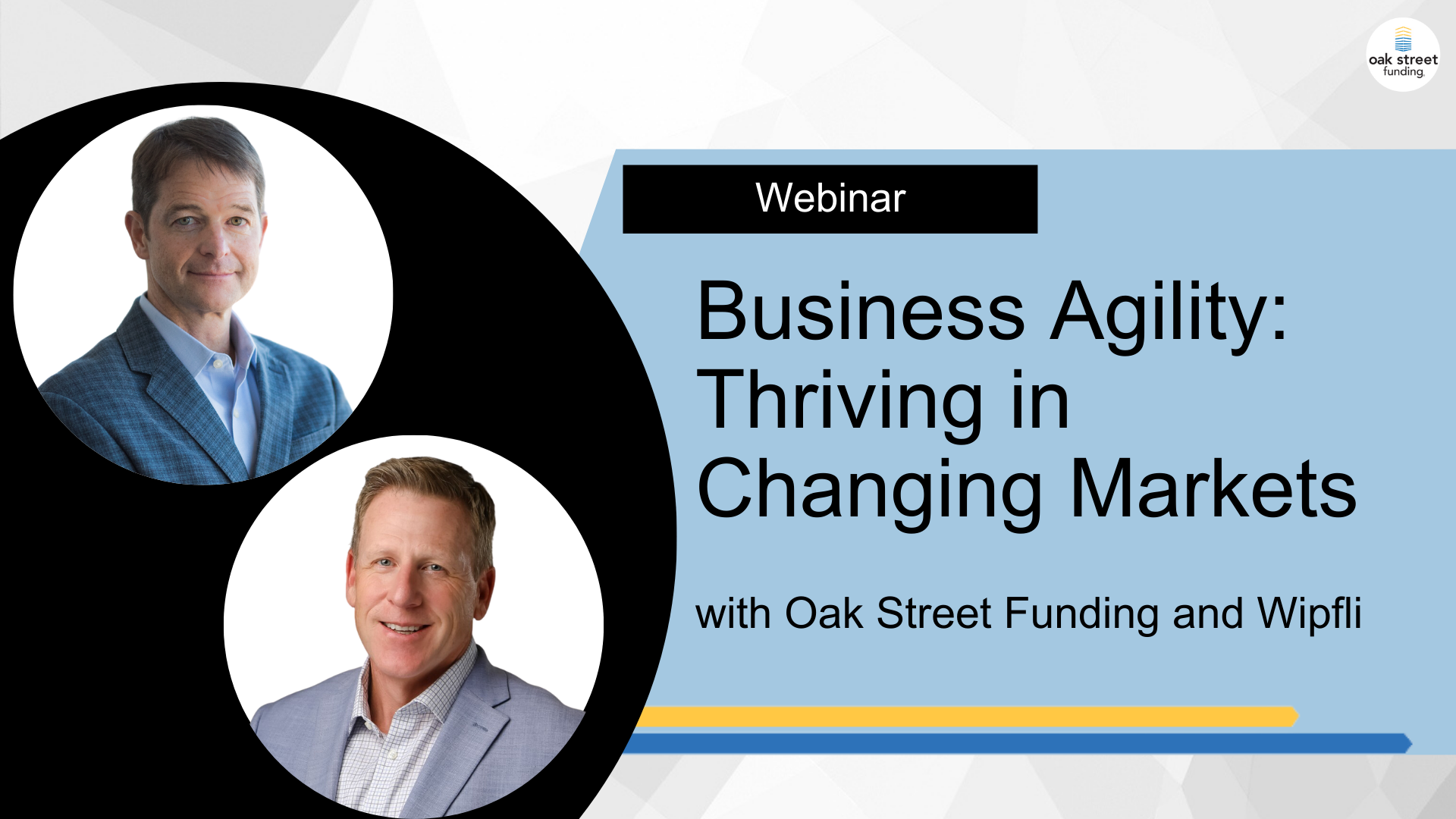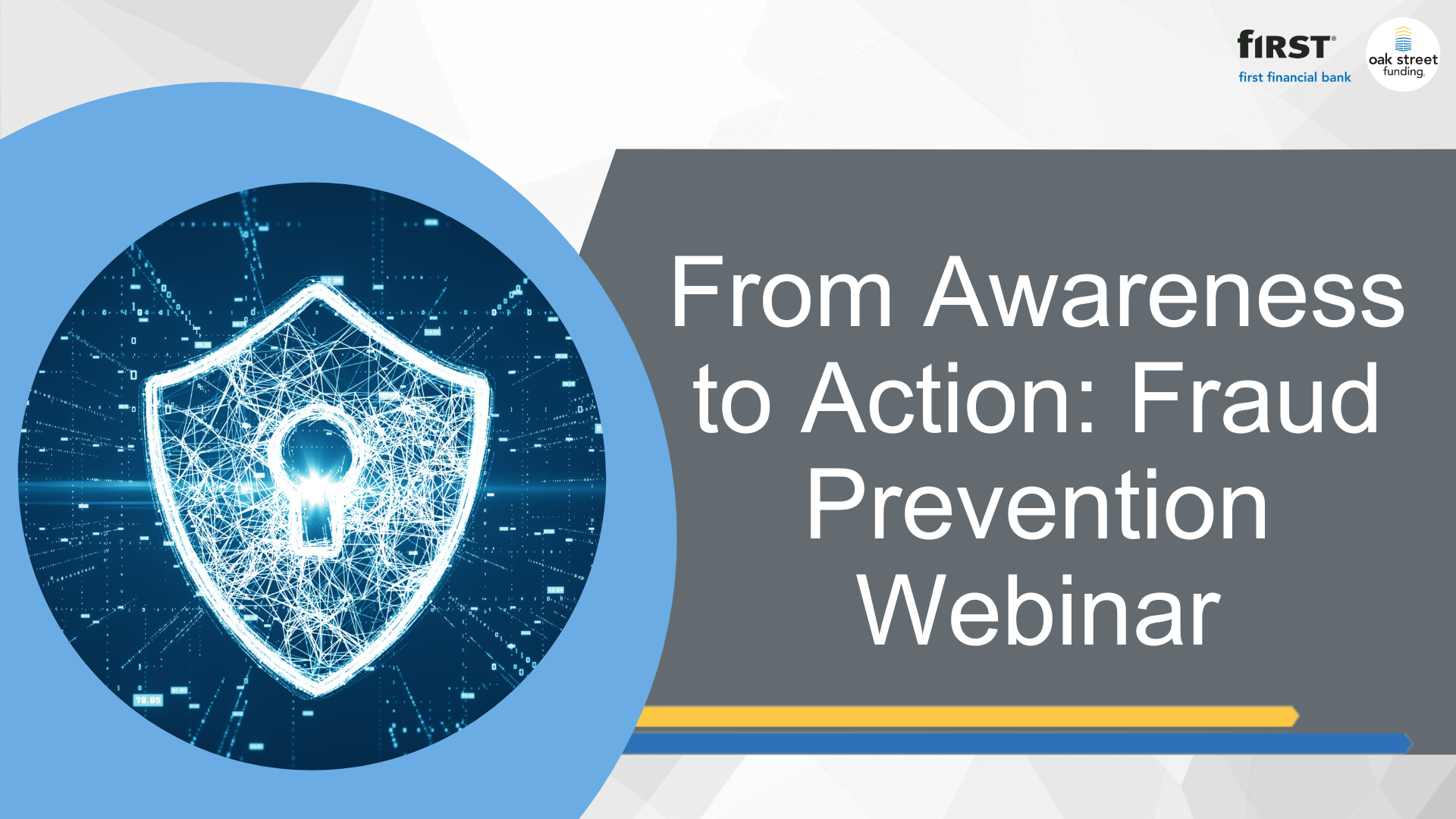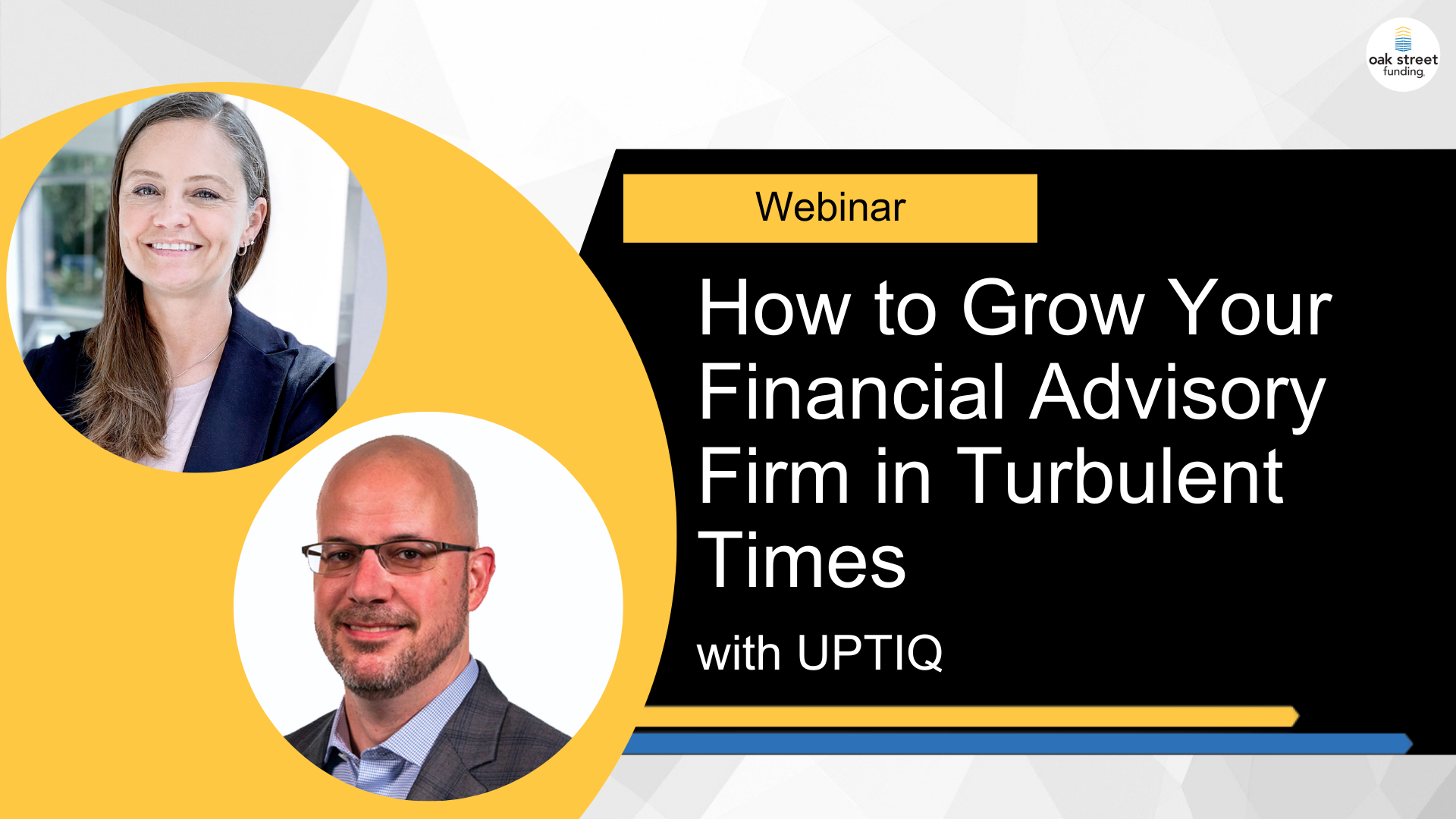Understanding Underwriting: A Q&A With Rob Roach, Director of Underwriting at Oak Street Funding
- 0.5
- 1
- 1.25
- 1.5
- 1.75
- 2
Bridget Haight: Hi everyone. And thank you for joining us today. I'm Bridget Haight, host and moderator for Oak Street Funding Webinars and Podcasts. Today, I am happy to be joined by Rob Roach, Director of Underwriting here at Oak Street Funding, for an inside look at the underwriting process and conditions. You will receive this content in the next few days with his contact information as well for any follow up. Rob, thanks for joining us virtually, and let's take some time to answer some questions.
Rob Roach: Great. Thank you so much for having me and thank you for everyone out there listening.
Bridget Haight: Themes that came from the questions were, the underwriting process, the current conditions, and specific cases. To begin, can you explain the process, the underwriting process, at Oak Street Funding?
Rob Roach: Sure. It's very exciting. One of the things I think we're very unique at Oak Street in the function that the underwriters play and how they interact with our client base and our prospects. One of the things that we do at Oak Street is get the underwriters involved very quickly when a salesperson is speaking with a client about a transaction and bringing it to one of the underwriters asking," Does it make sense what I'm thinking? What should we be looking for?" And beginning to really put together a structure that works for everyone. We're really involved in the front end, which is really something very beneficial for our prospects and clients. The second thing is, really working with that salesperson to issue what we call a term sheet, which some might know as a proposal in other areas, so really that beginning document to where the Oak Street and the prospect are kind of getting together on a transaction. What are we looking to do? What are we trying to accomplish? And maybe the beginnings of what that would look like. And kind of after that is, kind of agreed upon by the client. We really get involved on the underwriting side, and this is kind of where the nuts and the bolts of underwriting kind of come into play, where we really do a deep dive into what's the client looking to do? What role can we play and how can we best play that role? What benefit can we provide and really structuring something that's beneficial for both our client and Oak Street and putting together something that works, again for everybody and gets us to where we can close a transaction. Which I think is something, Bridget, as I think about it, something also unique from my background in banking, what you'll usually see as an underwriter, kind of going through the approval process, at which point they'll kind of step out and step out of the process and the client might not ever have met the underwriter. We're living unique at Oak Street in that we really have the underwriter working along with our sales team, that they get to know the client, the client will hear from the underwriter and on a lot of occasions, meet the underwriters. We'll go out to the client site and do due diligence on certain transactions. I think that's something unique at Oak Street. I think it's a good value that we provide our clients and they're able to get to know who's behind the curtain, as there is no curtain, obviously at Oak Street and really get to know the underwriter, which I think builds better conversations and better relationships in the end.
Bridget Haight: Great. The next question is, how is the valuation of a book determined relative to purchase price and how does that affect the deal?
Rob Roach: Yeah. Valuations are an important thing, I think for a couple different reasons. One of the things is, obviously we use a valuation differently than maybe a prospect would when they're buying another business, a prospect wants to know what, as you said in the question, how does that valuation help us determine maybe what the purchase price is and that type of thing, that's one side of it. What we're doing and how it affects the transaction on our side, is we're really looking at that valuation to determine, does it validate what we think the business might be worth, because we're looking at it from a collateral perspective, we're looking at it in a worst case scenario. What do we think the value of this business is? And so, can it affect the transaction? Absolutely, because we have obviously policies that we try to stay in. If you think about it, real estate, your mortgage, for instance, a mortgage company, maybe they want 80% loan to value. We're a little different than that, but maybe kind of the same idea when you're thinking about how that valuation might play into a transaction, that you're working to complete.
Bridget Haight: Okay. Above any down payment requirement, how much cash or liquid assets do you require?
Rob Roach: That's another great question. And one, it's a great question with no good answer, so that's something great. Really, it's kind of one of those things that there is no specific answer to. We'll have obviously a down payment, some cash we would like the borrower to have to kind of come into the transaction to fund it with some equity, that's something that we obviously always are looking for, some piece of that normally. Otherwise, what I'm looking for is, what happens if there's a blip or a maybe things aren't turning out exactly like we hoped. Does the borrower or the guarantor or the sponsor of the transaction have the capacity to inject a little bit of money? To inject money that maybe bridges us over a gap or something? Or is the only option to come back to the bank for looking for more money. Those are the kind of things that affect the cash balance. Obviously the stronger the company, maybe the little less cash we're okay with. And going forward with that, looking at the guarantor, does the guarantor have liquidity? That's something that we're looking at. Is it a situation where when I'm looking at a transaction, is the guarantor adding to the strength of this credit? Does the guarantor have sufficient liquidity to step in if there's an issue or step in, if there's some event that's unexpected? Those are the things I'm looking for. I would say really no set amount of cash that we would require above and beyond that down payment on a transaction. But one of those things that you're going to give the bank a lot of comfort with, you're going to give Oak Street a lot of comfort with, if you have some liquidity that," Hey, if something unexpected happens, I have the ability to handle it myself."
Bridget Haight: Makes sense. Next question. What are your available business line of credit options and qualifications?
Rob Roach: Yeah, so we are fortunate enough, we have a couple of different options at Oak Street. I'm going to pose these as maybe a couple different things. One of the options we have when we're looking at lines of credit, we have a non revolving line of credit. And what that really allows us to do is if you have a, and I'm going to pose this as an acquisition, because a lot of us are looking at acquisitions, that's what we're seeing in the market a lot of times. Maybe somebody has an acquisition they're currently looking at, but maybe they're also thinking," Well I have two or three other people I've been talking to recently and I'm trying to get them to sell in the next year, but they're really not there yet. But I'm thinking in the next several months, the conversations are really going to get going." One of the options we might propose is something like I just mentioned, a non revolving line of credit, where we have a deal now, so maybe that first draw of that line of credit completes the first acquisition. And then we have availability maybe for these other couple acquisitions that we think are down the road, that we think are coming. Those are the ones that we want to be set up for. Obviously we're going to underwrite them because you might not know exactly which ones you're going to get yet, so we want to be able to underwrite them as we get them. The whole thing about the bank, giving you the blank check, that doesn't happen a whole lot. We're still going to underwrite them, we're still going to look through those. But it's something that we can offer our clients, that non revolving line of credit. Now as a side to that, we also have the ability that we have a client that maybe has that one acquisition and they want to make it somebody they've been talking to for a long time, so they need a term loan to make this one acquisition, and so we'll provide that term loan. But as a secondary credit facility, they're saying," Maybe I want a little bit of a line of credit. Maybe I have an existing line of credit somewhere else," so we'll consolidate that line of credit and we'll do maybe a small line of credit for working capital needs, so much like a credit card or something like that, a fancy credit card. We'll do a line of credit for those working capital needs as a side item. A lot of times it's really tough for us to lead with that product, but something that we do have for our clients.
Bridget Haight: Okay. Now onto current conditions. What is the current rate environment like?
Rob Roach: The current rate environment is, I was trying to think of something really funny to say there, but it never came to me. Dynamic, right? I can't think of many conversations that we've had, the subject of many conversations that we've had more recently than rates. That's something I think that's on everybody's mind. It's something everybody's thinking about. It's in the news all the time. We're inundated with it constantly. And so I think people are looking at it from their mortgages, it's affecting home buying, it's affecting all this stuff. The market for rates is really dynamic. And if we want to get real fancy, we'll talk about inversion of the yield curve and things like that, which is beyond a lot of us that, we know what rates are, and we watch them, but inaudible to where now longer term rates, or maybe less than shorter term rates and it all sounds crazy and everybody's trying to figure it out. It's something we talk a lot about. We work with our clients a lot on. Figuring out how that works into your transactions. One of the things that we do whenever we underwrite a new loan is we always do a sensitivity analysis because the last thing we want to do is have an increase in rate or maybe something doesn't work out exactly like we thought it would, really have a detrimental impact on our transactions and on our clients. We always provide a little bit of a stress test to the rate, say," What happens if rates go up a little bit? What happens if they go up a lot and how does that affect what our clients are doing?" That's something we talk about a lot, Bridget, it's something that's on everybody's mind. And we can talk about some of the other things that go along with that, how it affects transactions, what it looks like in the future. And those are things that I can talk about one, but not the other, because I have no idea what's going to happen in a month from now with rates.
Bridget Haight: Okay. Well, is the current market affecting your deals in your strategies?
Rob Roach: In my opinion, is it affecting it? Yeah, it's affecting it a little bit because people are talking about it. People are concerned about it and rightly concerned about it because it's a scary topic. One of the things though I would say is I'm thinking through things, rates have been higher than they are now historically. Historically, we're still at a fairly low level of rates. And one of the things that I really feel strongly on, is that the interest rate is normally not going to make a good deal, bad. Senior debt plays an important role in an acquisition, plays an important role on buying new equipment on all these things. And the rate on that senior debt is important and it affects people obviously, but there's so many other things that affect an acquisition much greater than what the interest rate is on senior debt a lot of times. How well do you implement that acquisition? How well do you bring the book over? How well do you know all these other things, all these dominoes that have to fall in place? How are those doing? Because one of those can have a lot more effect on the transaction than the interest rate. And so is it affecting us? Yeah, we're doing a lot more stress testing. Our clients that maybe have some struggles, are they impacted a little bit more by an increase in interest rate? Yeah. But for the most part, one of our jobs is to help our clients stay in a situation where they aren't struggling, that's one of our goals, is to have healthy clients. And so we're trying to put them in positions where an increase in rates, it's impossible not to be felt somewhat, but to insulate our clients from that the best we can.
Bridget Haight: Okay. Thanks. Can you talk about the five C's of credit?
Rob Roach: Sure. The five C's of credit. And I had to look these up just a minute ago to make sure I had them right. And so I wrote them down just so I would make sure I didn't forget any of them. Capacity, capital, collateral, character, and conditions. These are all things I think, if you ask people how they would lend money, personally, if they had to lend money, they would all kind of fall back to these. They might not call them the same things, but they would ultimately come back and look at these same things as well. Capacity, that's what we were just talking about in terms of really, what debt load can a company sustain? What debt load is appropriate? How much can we pay back without really hurting the profitability of the company. Our chief credit officer at First Financials, he likes to say, he looks at every company like a tree and the tree has to support a lot of different people. The fruit of the tree has to support the debt holders. It has to support the owners, because the owners want to make money. That's why they're in business. It has to support their families and everybody else. Making sure that we don't load one side of that tree up too much, making sure that we have the ability that it can support everyone, and that's our goal there, that's capacity. Capital. We look at a lot of capital ratios. Capital, meaning how much equity does the owner have? How much money has the owner put into this company, him and herself? What is the cushion between how much money that we have as senior debt holders and how much money that the company has actually put in to buy the assets, to finance the assets? That's one of the things we look at as well. It's again, not to over leverage the company. Thirdly, collateral, that's pretty easy. What is our collateral in any lending relationship? Some people would have an automobile as collateral on a car loan. We have the assets of the companies that we work with. That's our collateral, which is a little different because the industries we're involved with at Oak Street, don't really have that physical collateral, they have computers maybe and office furniture and that type of stuff. What's our collateral? What does that look like? Conditions, we just talked about those two. What are the economic conditions that we're looking at? These could be from just a couple of examples that come to my head, interest rates, we just talked about interest rates. Are they stable like they have been for the previous, however many years ago, up until the last six, eight months, when interest rates have really become a little more volatile. That's something with that. You talk about industry, the RIA industry. Right now we see market swings. What does that look like for our clients? If their portfolios are down 20%, how's that affected them and how will the bounce back or how will further declines affect them? And so we're looking at those things when it comes to conditions out there. And then finally character. And I think this could be a five C's of picking a lender as well. From our perspective, it's what's the character of our borrower? Who are they as people? That's one of the things that we're really trying to get involved with as well. One of the things that I'm always excited to go do is, I'm always excited to go meet our clients, whether it's on site or whether it's over the phone or via a conference line, something like this. It's always good for us to be able to go meet our clients, to form that relationship. Our sales teams do a great job in forming that relationship with our prospects and clients, getting to know them, getting to know their business, so that we can become better advisors, better partners with them as we structure transactions and know what their goals are because that's important. And then I think the other side of that is it gives our clients an opportunity as well, and our prospects, to get to know us. We're not a nameless, faceless organization. We have people as well. And I think it's important for our clients to get to know who we are, because we want to be a great partnership for everybody. And so, I think that's one of the five C's, that's one of the things that I really like to concentrate on. We obviously work with great people and we want to take the time to get to know them and make sure we understand who they are.
Bridget Haight: I like it, underwriter who's also a people person.
Rob Roach: Isn't that crazy?
Bridget Haight: It is, but it's great.
Rob Roach: That's why I also have no call Friday or no email Fridays. I usually go out and try to either call people or walk around and see them, so it bothers a lot of people, but hey...
Bridget Haight: All right. Let's talk about specific cases. We have a couple of questions here. First person says, how can I get loan with high credit limits and not visible income value, although I am on point with all of my payments?
Rob Roach: That question's a bit scary because that sounds like the mortgage crisis. But looking at it so this is one of the, if I'm understanding the question right, one of the struggles that we have is, we want to know, and we have to know, what the financial condition of the company is, what the financial condition of the guarantors are. That's something we really have to know, we really have to understand. And we spend a lot of time on and some people would say,"Oh, you're spending way too much time." But that's something that we really need to get to know, as we get to know our clients. Really, we do a lot of verification. We ask for financial statements, we ask for tax returns, we ask for personal financial statements. Those are things that, again, as I said before, we really want to make sure that we understand our clients. The types of businesses our clients are for the most part are one pair of pants with different pockets. You maybe have one or two owners, maybe you have more, but, really a lot of times the individuals, they are the company. And so it's really hard to tear apart, what's the companies and what's the individuals. And so, making sure we understand those things. So I would say, reframe that, what's the best way for me to get a higher level of credit? One of the best ways is to really help us understand, who you are, who your company is provide the statements that we need so that we can verify kind of our initial thoughts and make sure we really have a good understanding of financially where you are.
Bridget Haight: Right. Okay, great. And then the next question is, we are interested in obtaining a working capital loan that could be used for firm growth or to buy shares back from a current partner upon a life event that requires their retirement. What hurdles do you see in obtaining this type of loan?
Rob Roach: Yeah. First of all, I'll say those are ones we do all the time. One of our strengths is we do a lot of loans for people that are looking for internal succession, internal buyouts. And so that's one of our strong suits that we really work with a lot of our clients on, so that's not something new to us, the hurdles there. One of the biggest hurdles, as silly sometimes as it sounds, getting everybody on board with what you're doing internally. The person who wants to buy in and the person who's selling, do you agree on a price? That's one of the things that's really kind of hard sometimes. And one of the other things, it could be challenging sometimes is we normally want the person who's exiting. The person, if they're selling all their shares, we want that person engaged and aligned with us somehow. One of the things we normally do is maybe we would request, they hold a little bit of a seller note. They get paid over the course of time so that they leave a little bit in the company as well, so that they have a little bit of skin in the game. I don't want to say skin in the game, but skin in the game, so that they have a little bit of something to lose. They want to promote the business. They want to stay somewhat engaged and so aligned with us because we're aligned for the company to grow, the person who has just bought it, they're aligned for the company to grow. And so we want to make sure everybody's kind of got that same mindset, so that's one of the things. Working capital, that's one of the things we help a lot of our clients with as well. Maybe you're hiring a team of advisors, maybe you're hiring a team of producers if you're an insurance company. Those are the things that we provide capital as well for people to bring over that team, for people to hire folks and bring them on board. We do provide those things too. One of the things I can think as well, one of the challenges sometimes is helping Oak Street see what your plan is, how do you plan to implement some of these things? If you're bringing a team of folks over, if you're buying in, what's going to change, what's going to change? What's going to be your plan to implement new people? Your plan to grow the business? Having a plan like that, that you can detail and be able to show a lender, something that is a very worthwhile effort and a very good exercise for you to go through, number one. But then being able for us to understand kind of how you see things working and how you see things rolling together so that we can all be successful.
Bridget Haight: Another question that we have is what kind of covenants do you usually include in a transaction?
Rob Roach: Sure. Normally, what we try to do is make it as simple as we can. A lot of times we'll normally have two, maybe three covenants when we work through something like this. One of the covenants, I'm sorry, we normally have, is something we call a debt service coverage covenant. Really the easiest way to think of it is, how much of my income is being dedicated to my debt repayment? Some people might see this in a mortgage application, you might do a debt to income ratio or something like that. What we'll normally do is something and I want to use industry jargon because it gets over to you sometimes, but your earnings before interest depreciation and taxes and amortization. What is your EBITDA less any distributions maybe, to the owners compared to your debt service, your debt payments? And it's just again, it's a calculation of how much more money are you making than your debt payments? It's something important to us, so something we want to build a little bit of cushion in there for us. Secondly, a lot of times we'll often have funded debt to EBITDA covenant. EBIDTA, same thing that we just talked about a minute ago, because I just threw it out there. Funded debt, what is our senior debt level compared to our earnings? And what that kind of tells us is, how leveraged from an operational standpoint is the company? Is it something that is you can take it forwards, is it three times, four times? How much more debt do we have than our earnings? That's something that we monitor and something we watch. And a good way to think about covenants for us is, it's a stick in the ground when we close, here's where we think we are. And then as we go through time, go quarterly, usually we test them quarterly, sometimes semi- annual or annually, where are we compared to that stick in the ground? Did we get better? Did we get worse? If we got worse, why did we get worse? What did we miss? Did we miss something in the underwriting? Did something change in the company? Has something changed in the industry? It really helps us to kind of come back to our client and say," Here's where we thought we were. Now we're a little bit different place. Help us to figure out why we're here and what we need to do to fix it."
Bridget Haight: That makes sense.
Rob Roach: Those are normally the only two we have. Sometimes we'll add some other ones, but normally we try to keep it as simple as banking can get, simple as lending can get, and so we really try not to complicate it too much.
Bridget Haight: That's great. Well, before we go, Rob, do you have any advice for our listeners?
Rob Roach: Yeah. I think, one of the advice going back to one of our earlier questions about, what's maybe some of the challenges borrowing money? I think one of the challenges and this is people look through their individual lives as well as we do require a good amount of information because again, we want to understand you, your business, we want to understand you. And that's just something that is a regulated industry, we have to do. And so, as you're putting that information together, the more clear you can make that bundle of information, the better. It's really helping us to understand, you and your company's story and helping us to figure out, how can we play a part in that? How can we play a part in your success? And what's the best way for us to put something, a credit package together for that, so that we can all meet those goals?
Bridget Haight: Well, Rob, this has been so informative. Thank you so much. Its not often we get to ask the underwriter of our loans, questions like this and get answers right away, so thank you for joining us.
Rob Roach: Thank you so much, and I appreciate your time and everybody out there that took time to view this as well. Hope you have a great rest of your day.
Bridget Haight: Well, that's all the time we have today, but it's clear that you want to hear more about the market and how it affects our underwriting decisions, so please join me on July 28th for a webinar following the next federal reserve meeting. And I will be joined by Rick Dennen, the CEO of Oak Street Funding and Mark Chandler, the Managing Director of Bannockburn Global Forex, as they discuss the federal reserve decisions and their implications to you, your businesses, and more. You will receive a link to register when you receive this recording. I hope to see you then. Thank you for joining.
DESCRIPTION
Join Oak Street Funding's Bridget Haight, for a Q&A with Rob Roach, Oak Street Funding's Director of Underwriting. Rob answers your submitted questions and pulls back the curtain on underwriting to help you understand how you can position yourself as a low credit risk. He also shares some best practices for running a business consistently well to set yourself up for future success. Want to learn more? Call 844-353-8022 to speak to an Oak Street Funding team member today.
Today's Guests








